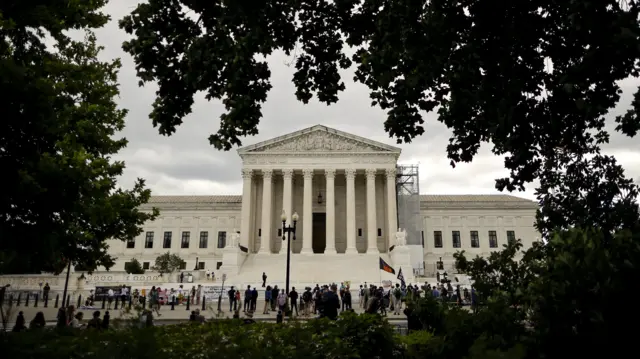Introduction
In a major legal victory for President Donald Trump deportation policy, the US Supreme Court has ruled 6-3 in favor of resuming deportations of migrants to third countries, even when those countries are not their homelands. This decision overturns a lower court ruling that had required the government to give migrants a chance to present their fears of torture or harm if deported to a third nation.
The Case at a Glance

The case involved eight migrants from countries including Myanmar, South Sudan, Cuba, Mexico, Laos, and Vietnam. According to the Trump administration, these individuals were classified as “the worst of the worst,” accused of serious crimes such as murder, arson, and armed robbery.
However, the migrants’ legal team contested these claims, arguing that many had no criminal convictions. They maintained that forcibly sending them to third countries, such as South Sudan, would expose them to grave human rights violations, including torture and death Trump deportation policy.
The Lower Court’s Blocked Order
In April, US District Judge Brian Murphy in Boston ruled that the migrants must be given a “meaningful opportunity” to contest their Trump deportation policy on humanitarian grounds, even if their previous legal appeals had been exhausted. The Biden-appointed judge emphasized the potential life-threatening consequences of deporting migrants to countries where they have no legal or personal ties.
However, the Trump administration swiftly challenged this ruling, elevating the case to the Supreme Court after the Boston-based appeals court refused to intervene.
Supreme Court’s Decision: A Divided Bench
In Monday’s ruling, the conservative-majority Supreme Court sided with Trump, allowing the deportations to proceed immediately. The court’s decision was unsigned, but Justices Sonia Sotomayor, Elena Kagan, and Ketanji Brown Jackson dissented strongly.
In her dissent, Justice Sotomayor criticized the ruling as a “gross abuse” of judicial discretion, adding, “Apparently, the court finds the idea that thousands will suffer violence in far-flung locales more palatable than the remote possibility that a district court exceeded its remedial powers.”
The dissenting justices condemned the decision for stripping vulnerable migrants of basic legal protections guaranteed by the Constitution and international law.

Trump Administration’s Response
The Department of Homeland Security celebrated the ruling, calling it “a victory for the safety and security of the American people.” DHS spokeswoman Tricia McLaughlin declared: “Fire up the deportation planes.”
US Solicitor General John Sauer argued that dangerous criminals should not remain in the US simply because their home countries refuse to accept them. He described the Biden administration’s workaround of temporarily housing deportees at a US military base in Djibouti as unsustainable, stating, “Immigration agents have been forced to establish a makeshift detention facility in a converted conference room.”
Another Win for Trump’s Immigration Agenda
This ruling adds to a string of recent victories for President Trump as he aggressively pursues stricter immigration policies during his second term. Just last month, the Supreme Court allowed Trump to:
- End Temporary Protected Status (TPS) for approximately 350,000 Venezuelan nationals.
- Suspend a humanitarian parole program that previously allowed nearly 500,000 migrants from Cuba, Haiti, Nicaragua, and Venezuela to remain in the US temporarily.
The resumption of third-country deportations represents a significant shift in US immigration enforcement, as it expands the government’s ability to relocate unwanted migrants to nations they have little or no connection with, bypassing traditional international agreements and asylum protocols.
Legal and Human Rights Backlash
Immigrant advocacy groups expressed outrage at the Supreme Court’s decision. Trina Realmuto, executive director of the National Immigration Litigation Alliance, called the ruling “horrifying,” adding that it exposes their clients to “torture and death.”
Human rights organizations have raised concerns that such deportations violate both US constitutional protections and international law obligations under the United Nations Convention Against Torture.
A Deepening Divide on Immigration
The sharp divide between the court’s conservative and liberal wings reflects the deepening political polarization in the United States over immigration. Trump deportation policy hardline policies continue to fuel intense legal battles and public debate, with critics accusing him of violating basic humanitarian principles and international norms.
The Supreme Court’s decision underscores how deeply the Trump administration has reshaped US immigration law, leveraging a conservative-leaning court to push aggressive enforcement policies while sidestepping judicial oversight that previously provided migrants with due process rights.

Conclusion: A Precedent-Setting Decision
This ruling is poised to set a powerful precedent for future US immigration enforcement. By allowing the government to deport migrants to third countries without providing them with adequate legal recourse, the decision significantly weakens the protections previously afforded to vulnerable asylum seekers and refugees.
As Trump deportation policy planes prepare for takeoff, legal experts warn that this Supreme Court decision could embolden further crackdowns on immigrants and spark new international diplomatic challenges with countries forced to accept third-party deportees.
For more updates on the evolving immigration landscape under Trump’s administration, visit Read More on Trump’s Immigration Policies.
External References
Image










